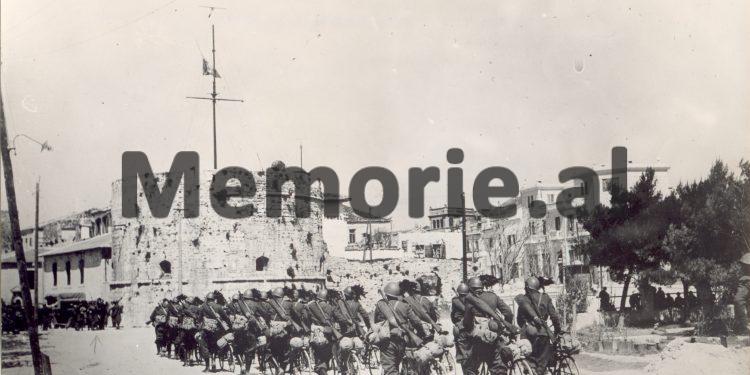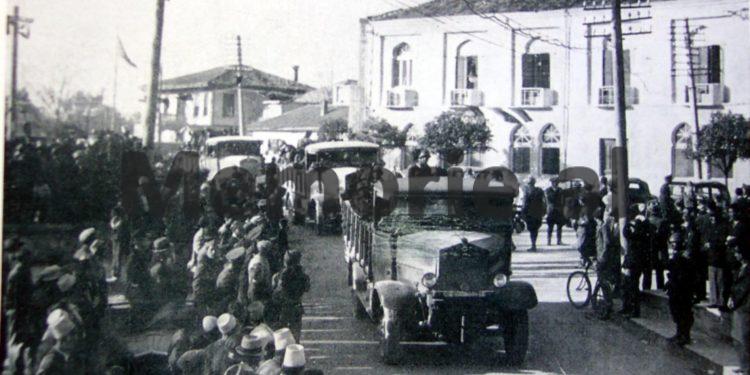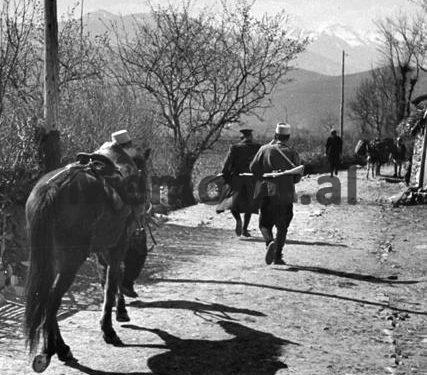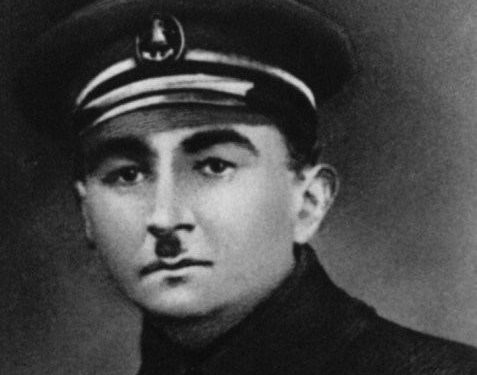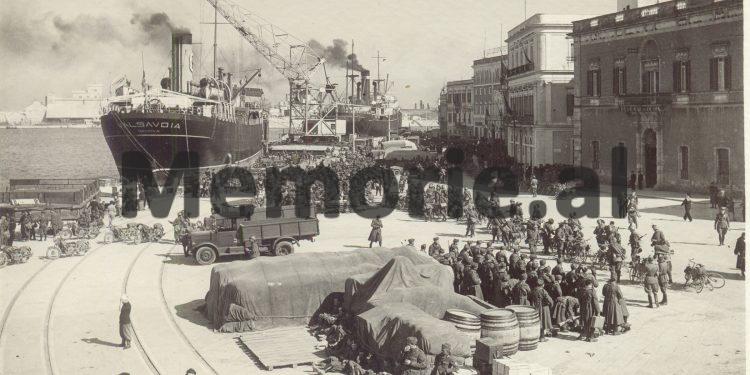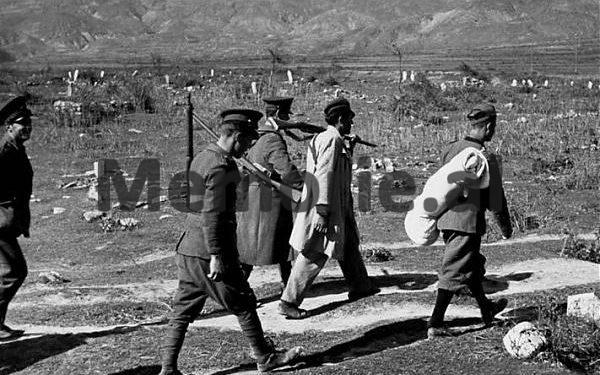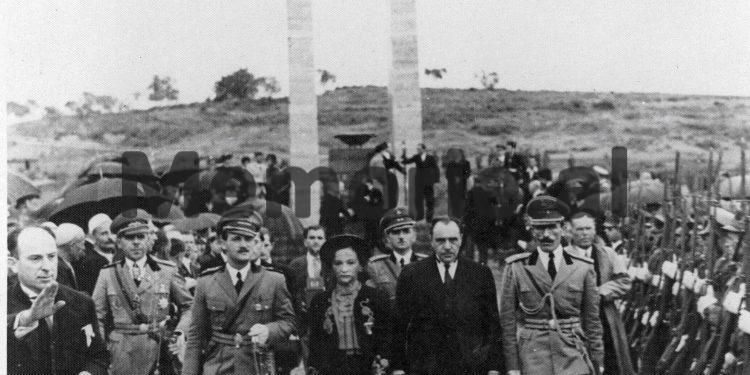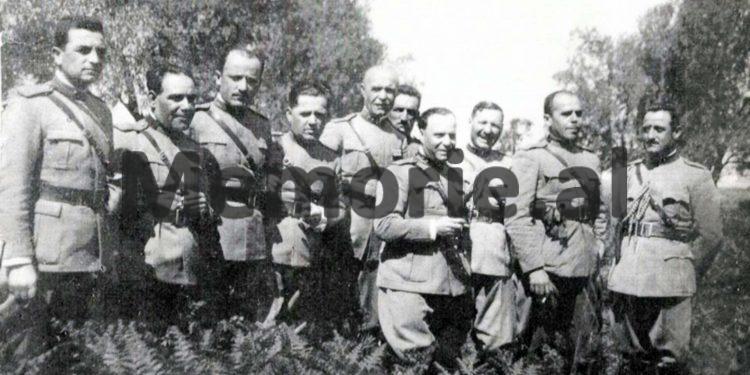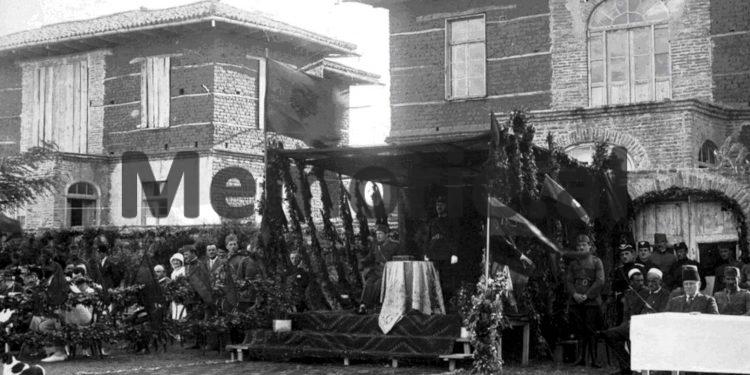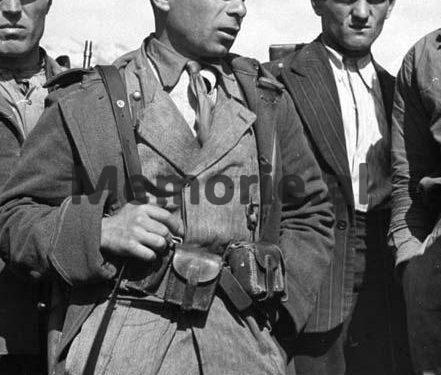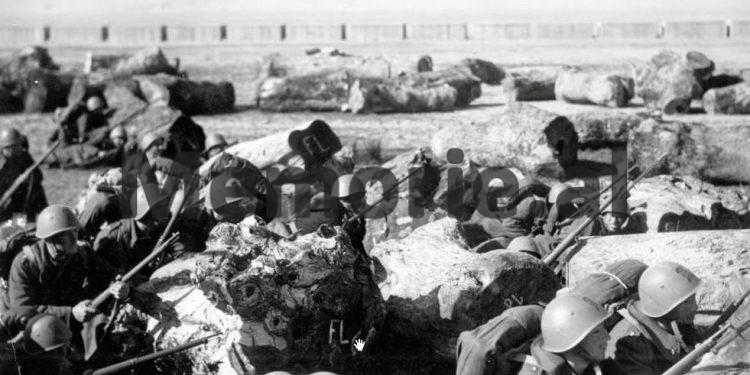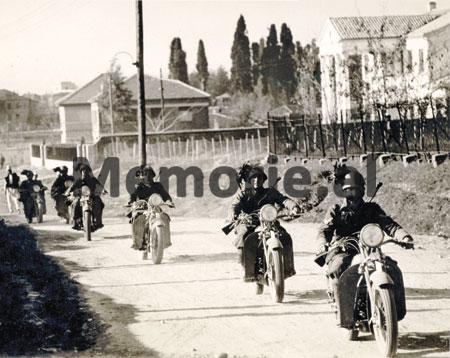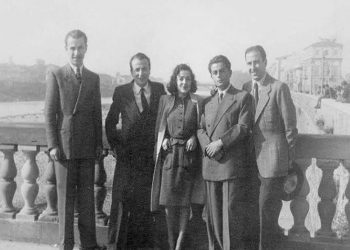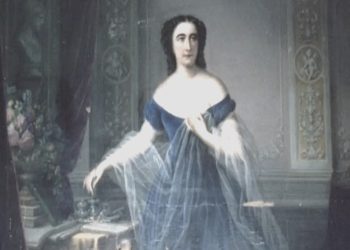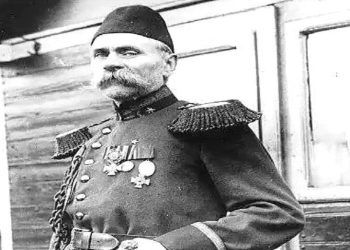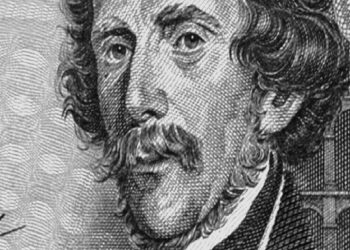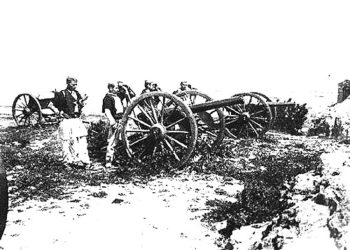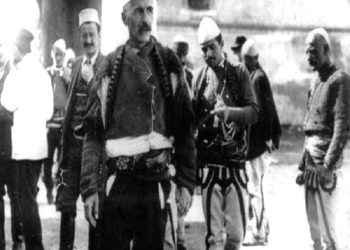Dashnor Kaloçi
Memorie.al publishes the unknown story of Kadri Rustem Bardulla, originally from the city of Peshkopi, who after graduating from the Officers’ Training School in Tirana, during the period of the Bird Monarchy served in several different duties in Tirana, Shijak, and Kavaja. , and in 1935 he was transferred as Commander of the Border in the area of Malësia e Madhe, where after an incident with the Yugoslav side, King Zog would remove him from there to bring him to the district of Durrës, with the duty of Coast Guard Commander.
The story of his wife, Hatixhe Jareci Bardulla, about the role of Kadriu’s contribution to the events of April 1939, when Benito Mussolini’s Italy carried out the fascist aggression against Albania and based on his function, Kadriu was the first to fire on the troops. Italian, giving the signal of the attack, as well as the memories of his former colleague, Captain Nuredin Pustina, who were together on the war front, regarding the real reasons for the murder of Captain Mujo Ulqinaku, by Italian forces.
The departure of Captain Kadri Rustem Bardulla from Tirana after the entry of Italian troops and subsequent emigration to Tuzla, Bosnia, with some of his military colleagues and his return to Albania in 1943, joining the Albanian National Army where he was appointed officer in The Border Command dividing Kosovo with Yugoslavia, and his assassination on July 9, 1944, in the building of the Prefecture of Dibra e Madhe by the Macedonian partisan communist communist forces, as he had previously refused to join the Albanian partisan forces operating in the area of Dibra, which would later be declared an “enemy of the people”.
Although my husband, Captain Kadri Rustem Bardulla, who was the Commander of the Coast Guard of Durrës and in the first days of April 1939, fought by giving the first signal of fire on the Italians, immediately after the end of the war, the communists declared him an enemy and traitor. we were kicked out of the house. ” This is what Khadija Bardulla (Jareci) told us about her husband, Kadri Rustem Bardulla, the senior military man of the Zog Monarchy, who first gave the signal of fire against the Italians on April 7, 1939.
Who was Kadri Rustem Bardulla and what is the past of his family? What was Kadri’s role on April 7, 1939, and why did he signal the fire against the Italians without being ordered by his superior command in Tirana? Why did he not accept during the War to join the partisan forces and how did he help them ?! What were the circumstances of his assassination in the Prefecture of Dibra e Madhe and why did the communist regime of Enver Hoxha declare him an enemy and traitor ?!
Military of the Monarchy
Kadri Rustem Bardulla was born in 1907 in the city of Peshkopi and after finishing primary school in his hometown, there in 1925 he came to Tirana and enrolled in the Officers’ Training School which he completed in 1928 with very good results. high and obtained the rank of lieutenant. Regarding Kadriu’s military career, his wife, Hatixhe Bardulla (Jareci), recounted: Shijak, Kavaja, and Durrës. Around 1935, he was appointed Commander of the Border in the province of Malësia e Madhe under the jurisdiction of Selca, Vermoshi and Kelmendi. Kadri remained in that position until 1937, when he was transferred by order of King Zog. The reason for Kadriu’s transfer came after a serious incident in the border area, for which the Yugoslav side protested vehemently to our Foreign Ministry, demanding Kadriu’s death sentence. Forced by the protests of the Yugoslav side and in order not to cause interstate problems, King Zog transferred Kadri to Durrës and in the official notebook it was written as if he had been degraded and prosecuted. At the time when Kadri was transferred to the city of Durrës with the duty of Coast Guard Commander, he took us to live in that city, because until then we lived in the city of Peshkopi “, recalled Kadri’s wife Rustem Bardulla, on his military career until 1937, when he was transferred by King Zog to the city of Durres.
April 7, ’39, gives the war signal
Being in the function of the Coast Guard Commander of the Durrës area, in the first days of April 1939, Kadri Rustem Bardulla had the opportunity to be one of the officers who organized the resistance that was made to the Italian troops at the time of disembarkation. Regarding that distant event, his wife Hatixhia testified: “I still remember those first days of April 1939 when the news broke that Italy would invade Albania. Since April 2, Kadriu has run away from home and all those days he has been in the wards and in his office without returning home at all. In those days, Kadriu also left Durrës, going to Bishtë Pallë and Shëngjin, where he inspected the military troops that had received a readiness order to stay in position. On the evening of April 6, Kadriu came home and took us all to Tirana. The next day, when the Italian troops landed in Durrës, we were at the Tujan Stairs, traveling on horseback to Peshkopi “, his wife Hatixhia recalled. But what was the role of Kadri Rustem Bardulla during that resistance to the Italian troops in Durrës? In this regard, some of the memories left by one of the other officers of the Royal Army, Kadri’s colleague named Nuredin Pustina, are shed light on. Among other things, Pustina’s memoirs read: “In those early days of April 1939, when I was coming from Tirana to Durrës with my family, Mujo Ulqinaku reported to me that the Italians who were serving near our Navy were removing the needles from the large cannons that were there. installed in the fortifications near the villa on the hill and those that were along the way to the church. I reported this to the Chief of Transportation at the Coast Guard, Captain Ibrahim Ishmi, and he informed the General who was the Commander of the Defense, and he was notified of the Commander of the Navy in Durres, who warned the Italians who were at the Defense Command. The Italians learned of Mujo’s information and did not forget it until they killed him. The depot officers and I had no soldiers under our command, but we went to the front line ourselves. I joined the border guards, under the command of Border Commander Captain Kadri Rustemi from Peshkopia. Kadriu called Captain Akil Sakic, who was the battalion commander, and told him that the Italians had landed on the ground and started walking towards us. The company was located near the Bank building, very close to port. After at that time the telephone connection with Tirana was cut off and did not work, Kadri Rustemi pulled out his revolver and fired first. This was the sign of the war signal giving the order to open fire on the Italians and immediately after Kadriu’s signal, all the units wherever they were deployed in positions began to open fire in the direction of the Italians. As a result of that incessant fire, the Italians were caught by surprise as they did not think they would be resisted. After that, they withdrew and were locked up in the warships, but during the retreat there were many killed and wounded by them “, it is said in the memoirs of Nuredin Pustina, regarding the events of April 6 and 7, 1939, where Kadri Rustemi was the first officer to signal the fire on the Italians.
Immigrant to Bosnia
After the invading Italian army broke the resistance of the Royal Army of the Zog Monarchy and entered Durrës and Tirana, Kadri Rustemi and the other soldiers left to avenge the Italians who had issued the order. -arrests for all those officers who had received them with rifles. Regarding Kadriu’s departure from Durrës, his wife Hatixhia told us: “On the evening of April 7, 1939, Kadriu left Durrës for fear of possible arrest and came to Peshkopi where I was with his three young children… As early as the evening of April 7, we received news that Kadriu had been killed and that he had died at home. But then one of the old men of the house insisted that we should not have opened the mortuary yet without knowing the truth about Kadri, and so that thing was closed. When Kadriu came home, we were overjoyed that he was alive, but he did not stay long, as the Italian authorities had issued an arrest warrant for him. As a result, he was forced to emigrate to Tuzla, Bosnia, Yugoslavia, along with many of his Monarchy’s military colleagues. In that city Kadri stayed as an immigrant until the end of 1942, or the beginning of 1943, and during that period he became more associated with Mustafa Gjinish, whom he had a close friend. When he returned to Albania, Kadriu was mobilized in the National Army and appointed as a border officer in the Pristina Command covering the Kosovo-Yugoslavia border. When Fiqëri Dinja came to power in Tirana as Prime Minister, Kadriu was transferred and came to Peshkopi with the duty of Battalion Commander “, Hatixhe Bardulla recalled, for the military career that her husband, Kadriu, pursued after 1939.
Execution and persecution of the family
Regarding the period when Kadri Rustemi was the Commander of the Battalion in the city of Peshkopi, Khadija recalled: he did not arrest them according to the order given to him. At the time, one of the top partisan leaders in the Dibra province called on Kadri to join the partisan forces, but Kadri refused, saying he could not fight under communist orders. Kadriu was killed on July 9, 1944, inside the building of the Prefecture of Dibra, by the Macedonian communist foract, which on that day had taken an offensive against the nationalists, killing about 15 of them. Although Kadriu was buried in Dibra e Madhe by some friends of our family, a few days later the Albanian government of that time organized a ceremony announcing that he had fallen in office. But this attitude towards Kadri Rustemi at that time was changed by the communists who came to power in December 1944. They immediately declared Kadri an enemy and traitor and removed us from our house, leaving us to live only in the basement and its, where we stayed for seven years. We were not deported like many other families, probably because we posed no danger, but since then and throughout the communist regime, we have been called reactionary families, and my two sons, Genci and Musa (Pulin), have barely managed to do so. to get high schools with correspondence “, concluded her story Hatixhe Bardulla, about her husband, Captain Kadri Rustem Bardulla, the former Military of the Zog Monarchy that the communists declared” enemy and traitor “even though he was the officer who had given the officer first the fire signal to hit the Italians on April 7, 1939. Memorie.al




